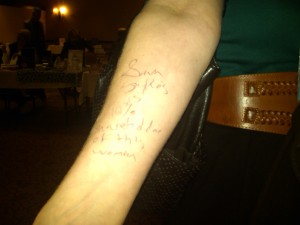Short Fiction Jam Session of Despair
A man waded into the water once.
It was a spontaneous thing to do that he had been planning for months. It was the solution to all his problems. Women loved spontaneity, as much as they loved planning and other things that the television had told him they loved. Men respected spontaneity, they would clap his back and say “you crazy son of a bitch” in a way that meant good things instead of bad. This was what people wanted him to do and he did so.
He waited patiently for someone to walk by and notice him. A woman did, but did not. He looked at her and said: “Do you see the craziness here? I am a rather wild and spontaneous fellow and this is the sort of thing your kind likes. I don’t like to say ‘your kind,’ since I don’t want to be with a woman who can be boiled down into a kind, but I kind of want to be the kind of woman who I can categorize from time to time in kind so that they’re easier to handle. The thing is, I know that you’re supposed to be hard to handle and that’s the reward, but I’m desperately afraid of dying alone, being alone and being okay with being alone, so I kind of hope this will just go right so I don’t have to work so hard and so that I can rest easy knowing I’m going to die some day. So maybe you could come into the water with me and you’ll ignore everything but that and this will work.”
But he said it with his eyes, like handsome men do, and he was not a handsome man so she kept walking.
He thought about walking after her and just saying these things with his mouth, but he remembered that he had always given up too soon on things. He was a quitter. When things got hard, he would quit them. If he did that now, someone would see him and say: “Wasn’t that man being spontaneous a few moments ago? Now he is just walking back and forth like an ordinary person on dry land. Such a wishy washy state suggests a defect of the mind. Officer? Officer! That man was being spontaneous a moment ago and now he is not. I fear he might have a mental illness. Yes, please put him on the watch list of sexual terrorists. Yes, thank you.”
He was not a quitter. Not when it counted. Not when it came to standing in the water. So he stood and waited a long time for someone to see how wacky this was.
And someone did and someone saw. But they got it all wrong.
“The tide is rising,” they said. “You’re going to find yourself without clean clothes.”
“I know,” he said. “I won’t have any clean pants to wear to work tomorrow and they will likely fire me and I will have to leave my apartment because I am poor. Then everyone will know I am poor because I will have become addicted to meth. That is what poor people do and I will be one of them. I dearly wish I wasn’t going to be addicted to meth.”
“You could move. The tide hasn’t reached your pants yet since you rolled them up.”
“Well, no, because of that reason I already had an internal monologue above.”
“Oh.”
“Yes. Damned if you do, damned if you don’t.”
“I don’t think it works that way,” they said. This seemed to be leading toward an argument, so he just nodded politely and stared down at the rising water.
He did lose his job because he didn’t come into work the next day or the next. How could he have, he asked himself? His coworkers knew he was going to the beach. He had told them. And if he hadn’t, they would know. Somehow, they would know and they would hate him for it because he had given them no reason to like him. If only they had come here and seen what he had done, he would have had their respect. Life was so unfair.
And the reason it was unfair was because a young lady got married the very next day on the beach. He stared at the spot next to her adoringly and wished he was standing there. He would have looked very nice in a suit. Then he would have gone on his honeymoon and he would have had a good time and he would talk about being married and he would tell stories about being married and he would be married and he would be happy. Not to that woman, though. She was kind of fat.
Maybe a marriage wasn’t the best solution, he thought, because the very next week the Apocalypse happened. He noted down that the Zoroastrians had it right. Hadn’t he had a conversation about this last week with his coworkers? He should have said something then, because they would have laughed and he wouldn’t have had to come out here to be spontaneous for three weeks. Those crazy Zoroastrians. “Man, he totally called it,” they would have said. He couldn’t think much further than that because people were screaming and running away from the end of the world and no one even bothered to look at him.
Life continued to be unfair. Eventually the ice caps melted and he drowned.
The end. No moral.
Short Fiction Jam Session of Despair Read More »




